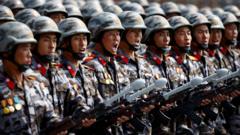In a historic move, Ivory Coast has declared the impending withdrawal of French military forces, with President Alassane Ouattara stating that the modernization of the Ivorian army has rendered French troops unnecessary.
Ivory Coast's French Troop Withdrawal Signals Shift in Regional Power Dynamics

Ivory Coast's French Troop Withdrawal Signals Shift in Regional Power Dynamics
Ivory Coast's President Ouattara announces the departure of French forces, marking a significant change in French influence in West Africa.
In a decisive announcement, President Alassane Ouattara has confirmed that French military forces will withdraw from Ivory Coast this month, a step that follows similar actions by other West African nations. This decision has been framed by Ouattara as a reflection of the Ivorian army's modernization, emphasizing national pride and self-sufficiency.
"In this context, we have decided on the coordinated and organized withdrawal of French forces from the Ivory Coast," Ouattara stated during a nationally broadcast address on New Year's Eve. The withdrawal will see French troops hand over a military camp located in a suburb of Abidjan, the country's economic capital.
Historically, France has maintained a significant military presence in Africa, with troops engaged in various operations across the continent, most notably in the Sahel region in recent years amidst rising jihadist threats. However, this presence has come under increasing scrutiny, especially in former colonial territories where sentiments towards France have soured.
The relevance of French forces in Africa has been increasingly questioned, as exemplified by the coordinated exit of troops following similar withdrawals in countries such as Chad and Senegal. Currently, France’s military footprint in Africa will be reduced primarily to bases in Djibouti and Gabon.
Criticism has intensified in many former colonies, with accusations of neocolonialist practices and patronizing approaches towards local governance and economies. This growing discontent has been leveraged by military juntas in the region, as they seek to garner popular support against perceived foreign influences.
As the geopolitical landscape of West Africa continues to evolve, the consequences of this withdrawal not only reflect shifts in national sovereignty but also illustrate the complex dynamics of international military relations in the region.
"In this context, we have decided on the coordinated and organized withdrawal of French forces from the Ivory Coast," Ouattara stated during a nationally broadcast address on New Year's Eve. The withdrawal will see French troops hand over a military camp located in a suburb of Abidjan, the country's economic capital.
Historically, France has maintained a significant military presence in Africa, with troops engaged in various operations across the continent, most notably in the Sahel region in recent years amidst rising jihadist threats. However, this presence has come under increasing scrutiny, especially in former colonial territories where sentiments towards France have soured.
The relevance of French forces in Africa has been increasingly questioned, as exemplified by the coordinated exit of troops following similar withdrawals in countries such as Chad and Senegal. Currently, France’s military footprint in Africa will be reduced primarily to bases in Djibouti and Gabon.
Criticism has intensified in many former colonies, with accusations of neocolonialist practices and patronizing approaches towards local governance and economies. This growing discontent has been leveraged by military juntas in the region, as they seek to garner popular support against perceived foreign influences.
As the geopolitical landscape of West Africa continues to evolve, the consequences of this withdrawal not only reflect shifts in national sovereignty but also illustrate the complex dynamics of international military relations in the region.



















